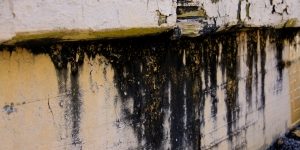Maintaining the proper moisture level inside your home or commercial property is vital for your health and that of your property. Too little moisture causes physical discomfort to occupants, increases static electricity and can damage flooring, moulding and other wooden installations. Excessive humidity, on the other hand, can lead to moisture damage, along with mildew and mould growth. While the effects of deficient humidity are immediate and apparent to most people, issues with dampness and moisture damage aren’t always so easily spotted by the untrained eye. Learning how to prevent moisture issues, and how to repair any existing damage, can mean the difference between a healthy, stable building and one plagued by diminished structural integrity.
Common Causes of Dampness and Moisture Damage
To learn how to best protect your home, it’s important to first know how moisture problems commonly begin. Water penetration from leaks in roofing, or from rising damp, may not always be easy to spot if damage isn’t visible in the form of discolored ceiling or wall spaces. Still, mould, mildew and excess moisture may be present on your property, and may be causing trouble without your awareness.
Improper drainage on your property can also cause its fair share of troubles, as can leaking or burst plumbing pipes, sub-floor obstructions or inadequate sub-floor ventilation. Blocked or overflowing guttering can also lead to moisture damage around a building’s foundation, since the flow of water isn’t being directed away from the structure, as intended. In the end, there are many potential causes of moisture intrusion with one common outcome among them: moisture damage to your property.
How to Avoid Extensive Moisture Damage
Some potential moisture damage can be averted with simple homeowner maintenance. Clearing any clogged guttering and having any plumbing leaks repaired immediately will go a long way. Still, the average homeowner will not be able to diagnose damaged damp-proof courses or inadequate sub-floor ventilation.
This is where the services of a professional building inspector can make a very real difference in the long-term structural integrity and safety of your home. Because a professional inspector does not provide repair or water mitigation services, they have no financial stake in their findings. You’re able to obtain a clear, unbiased report from a thoroughly neutral third party, which can help you negotiate more effectively with repair professionals and avoid unnecessary charges.
If you suspect moisture damage in your home, or are thinking of purchasing a new property, protect yourself and your real estate investment by obtaining a professional building inspection report. By catching potential issues before they become severe and pressing issues, or before you’ve assumed ownership of a damaged property, you can be sure you’re protecting yourself and your interests to the best of your ability.
Houspect Building Inspections– Buy, Build, Invest and Sell with Confidence







